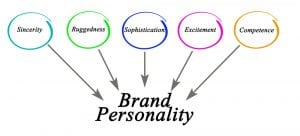Branding in the digital age presents some unique challenges. Customers have more opportunities to connect with their favorite brands than at any other point in history. In addition to visiting you at a brick and mortar location, then can follow your brand on social media, sign up for your email list, and visit your website whenever they want to.

The freedom that customers have makes creating a consistent and memorable brand absolutely crucial. You can’t afford to take a scattershot approach to marketing. You have to plan. Regardless of your industry or competition, you must give serious thought to the image you want to present – and then take pains to be consistent wherever your name and brand appear. One of the keys to that is creating a unique brand personality that speaks to your target audience.
What is a Unique Brand Personality?
If you don’t know what a unique brand personality it, now is the time to learn. To put it in simple terms, customers naturally ascribe human characteristics to the brands they follow online. For example, the energy drink company Red Bull has a young, brash, and slightly irreverent brand personality. Dove, the cosmetics company, has a warm and feminine personality.
There are several aspects of brand personality that you need to consider.
Memorable Brand Image and Appearance
The first thing to consider is your brand’s outward appearance. Who speaks for your memorable brand? How do you present yourself online and offline?
A brand’s logo is a key element of brand image and appearance. It’s why logo design is as much a science as it is an art. A company that chooses conservative images, fonts, and colors for its logo is also creating a brand personality that aligns with their conservatism. To make their brand memorable.
Likewise, a company that caters to teenagers might choose bright colors, stylized designs, and project a youthful or playful image. They might also choose to release content featuring people in their target demographic.
Unique Brand Values
Next up are the values you want people to associate with your brand. Just as we tend to look for values that align with our own when we choose friends and partners, we do the same for the companies we choose to buy from.

The values you choose to highlight in your brand’s personality may be personal values, such as honesty, integrity, friendliness, or confidence.
You may also choose to align your company with social values such as equality, environmentalism, or social justice. Social values are particularly important to Millennials, and any company that wants to attract Millennials as customers should consider taking a stand on social values.
Unique Brand Voice and Attributes
The final element of brand personality is your brand voice and attributes. When you think about the people you know, you realize that each one of them has a unique voice. They all have attributes that make them different from everybody else.
Your unique brand is no different. When you take the time to think about how your brand speaks to people – whether you speak through a brand ambassador, a mascot, or on your social media pages – you will realize that the tone you use determines, at least in part, how people respond.
Brands who want to appeal to young people may adopt a casual, fun voice. Conservative brands in conservative industries may opt for a very serious or even lofty tone. The voice you pick should be a reflection of your audience, your values, and the image you want to convey.
Determining the Right Personality for Your Unique Brand
Now that you understand the elements of brand personality, it’s time to determine the right personality for your brand.
What Do You Want to Tell Your Customers?
You can’t control everything your customers think about you, but you can encourage a certain perception through your unique branding. As you begin to develop your brand’s personality, think about what you want your customers to know about you.
If your company manages retirement portfolios, for example, you might want to tell your customers that you are honest, reliable, and methodical. On the other hand, a tech company might want to tell its customers that they’re forward-thinking, innovative, creative, and fearless.
You should also think about how the attributes you want to project align with (or could align with) personal and social values. For example, The Body Shop is a company that aligns its attributes of warmth and compassion with social values that include opposition to animal testing.
What Do Your Customers Want to Hear from You?
After you’ve decided what you want to tell your customers, it’s time to look at things from the opposite angle. What do your customers want to hear from you? Sometimes the attributes and values that companies choose might not be an accurate reflection of what their customers want.
Let’s use the same example as above. If people are going to trust a company with their retirement funds, what qualities do they want to see? Some may overlap with what the company wants to tell them, such as honesty and reliability. However, others may differ.
It’s not unusual for people to make buying decisions with their emotions. Sometimes, companies fail to understand that. Investors might be far more inclined to choose a company that emphasizes warmth and compassion together with trustworthiness than one that focuses only on trust as an attribute.
It might be difficult to know what customers what from you, but customer research can help in this area.
What Tone and Methods Can You Use to Connect?
The final question to ask is what you need to do to convey both what you want your customers to know and what they want to hear. The tone you choose and the methods you use both play a role in getting your message out.
Rolls Royce is a brand that represents luxury and exclusivity. Many of their cars are custom made. A look at their Facebook page reveals a rather lofty tone, one that makes it clear that not everybody can afford a Rolls Royce. The tone they use speaks directly to their customers’ desires.
On the other hand, the skin care company Dove uses a very warm and feminine tone. They share personal stories. They also continually raise awareness about issues that women care about, including sexism in the media. The message they send aligns with what their customers’ key concerns.
How to Use Your Unique Brand Personality
After you have taken the time to develop a strong and unique personality for your brand, the next step is to use it whenever and wherever possible. Consistency is one of the keys of strong branding, so it’s essential to use your brand personality in all of your marketing.

Brand Personality and Your Website
Your website is home base for your presence on the internet. For many customers, it will be the first place they go to find out about your company. It’s important that your website represents your brand personality.
Let’s continue to use Dove as an example. Their website features information about their products as you might expect. However, they also highlight positive messages for women. On every page of their site, they emphasize their message that real beauty comes from within. It’s a very effective use of their brand’s personality.
Unique Brand Personality and Social Media
One of the best things about using social media to connect with customers is that it gives businesses the opportunity to reflect their audience’s concerns in real time. Here again, Dove is a great example.
In one Facebook post, they asked followers to share stories about their mothers in honor of Mother’s Day. Dove responded to some of the messages personally. In some cases, they actually made memes of their followers’ comments and posted them in response to the original messages. This is a great example of personality marketing because it incorporates customers’ voices directly into the brand’s message.
Memorable Brand Personality and Paid Advertising
Just as your website and social media pages should reflect your brand’s personality, so should your paid advertising. If you’re paying to run an ad on Google or Bing or YouTube, the message you send in your ad must be consistent with your overall brand personality.
Dove’s print and video ads are a clear reflection of their personality. They feature models of every size, age, and ethnicity in their ads. Everything they do emphasizes their central message and communicates their core values.
Of course, Dove isn’t the only company that does a good job of using a brand personality to connect with their customers. Companies like Red Bull, Hello Flo, Friskies, and Jaguar all maintain consistent branding messages that use personality as part of the equation. They reap the rewards of customer loyalty and engagement as a result.
Conclusion for A Unique Brand
Developing a unique and consistent brand personality is a must for any company that wants to make the most of its existing customer base. Take, for example this blog about creating unique sports logos that really stands out and shows consistent brand personality. If you take the time to really consider what you want to say to your customers. Considering what they want to hear from you, then you can create the kind of brand personality that turns prospective customers into paying ones.

